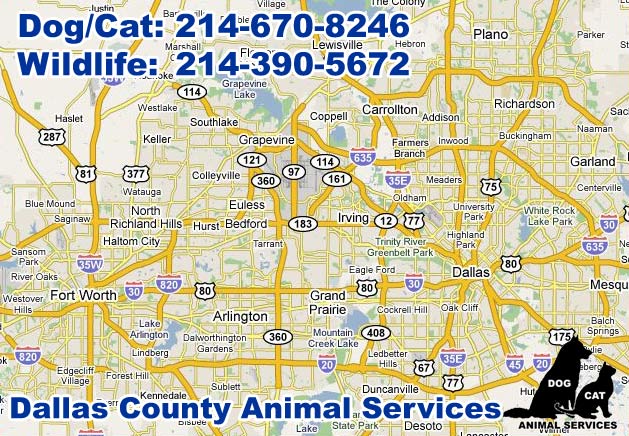Tarrant County Animal Control Services

| FOR A DOG OR CAT PROBLEM, CALL: 214-670-8246 If you have a problem with a domestic animal,
such as a cat or a dog, the county animal services can assist you, and this is a free service. If you have a complaint about a dangerous dog or cat, a nuisance
barking dog, a stray cat, kittens, puppies, pet adoptions, negligent pet owners, Dallas SPCA, or Dallas Humane Society, give the county a call. The county will not handle problems with wild animals, such as squirrels, rats, skunks, raccoons, snakes, etc. Some people feel that the county animal services should pay for wildlife problems. However, they do not handle this service. The truth is that most wildlife problems involve a level of service and expertise that a government agency can't deliver. Wildlife control requires special training and knowledge, and often involves detailed property and home inspections. |
| FOR A WILD ANIMAL PROBLEM, CALL: 214-390-5672 This is the number for the a professional, fully licensed and insured, wildlife and pest control company servicing the greater Dallas, TX area and it is a pay service.. They perform all facets of pest control, and specialize in the humane removal of unwanted wildlife from homes and commercial properties. If you have a problem with a wild critter, such as a raccoon in your garbage cans, a squirrel in the attic, a colony of bats in your building, a mouse or rat infestation, or a problem with pigeons, they can take care of the problem. Give them a call any time, and we are happy to discuss your wildlife problem, offer you a price estimate over the phone, and schedule an appointment, usually same day or next day. Their number is 214-390-5672 and they answer 24/7. |  |
| We service the greater Dallas Texas area, including Fort Worth, Arlington, Plano, and all areas in between, such as Mesquite, Balch Springs, Lancaster, De Sote,
Duncanville, Cedar Hill, Mansfield, Grand Prairie, Irving, Farmers Branch, Carrollton, Richardson, Garland, Allen, Lewisville, Coppell, Grapevine, Euless, Bedford, Keller, Haltom City, and more. Call us any
time for professional wildlife pest animal control in Dallas. |

Common Problems Caused By Stray Cats in Dallas TX
Stray cats cause several problems more than what you imagine. The problems of stray cats is quite extensive in Texas as they can almost be found everywhere and sometimes in large numbers. Some organizations in some areas have recognized the problems caused by stray or feral cats and are doing there best to help solve them. One is the Tarrant County animal services.
Stray cats refer to abandoned or escaped cats that are no longer pets of anyone. Feral cats are cats born to stray cats that have never stayed with humans in a home before. 12 weeks old kittens that have not been exposed to humans may never get used to humans again. This thus makes them afraid of humans, which means that they are easier to attack humans if they feel threatened are certain to try to avoid capture. Strays that used to have a human owner are more likely to die from starvation as they are used to being fed and lack the necessary skills to hunt and fed for themselves. Feral cats that have not be neutered will spray all over the area causing quite a nuisance.
Catís have a window of socialization when they have to be exposed to humans or anything you donít want them to be scared of. Just like dogs, if they miss that window they will be scared of humans and would easily get aggressive. It is thus not advisable to approach or try to stroke strange cats that you meet on the way, because they could spit and scratch you. Young feral cats may still be able to be tamed, but as they grow older it gets more difficult to tame them and get them domesticated enough to be placed in peopleís homes. Stray and feral cats can cause a lot of damage on the bird population of an area especially if the cats are many in number.
Another major problem caused by stray cats has to do with diseases. Cats on the loose usually stay together in small close colonies. This makes it quite easy for one sick cat to infect all the others. The case is even worse among feral cats since they have never been vaccinated. It is thus easy to catch and spread cat diseases such as feline leukemia, feline HIV and rabies. Stray cats also are usually infected with ticks, fleas and worms, which they can easily spread to humans and animals that come within close contact with them. Cat with rabies can cause serious danger to humans staying nearby as rabies makes infected animals more aggressive and they can spread it to the humans they bite.
Since stray cats are foragers that go about looking for food and they can easily carry and spread diseases to house pets and humans. For example, if a sick cat comes scrounging for food in your back yard, it can leave some diseases and infections that can be picked up by your own pets or even you yourself.
The breeding rate of stray cats is yet another problem that causes serious concerns. With their high breeding rate, a few strays and feral cats can soon over run an area. For example, a pair of breeding strays will breed about twice a year and can have as much as 420,000 offspring in just seven years. While not all of the kittens will survive it will still be quite an impressive colony.
In conclusion, stray cats can cause several problems including attacking and hurting humans and birds, spreading diseases and breeding and increasing rapidly.
Tarrant County TX Animal Control News Clip: Time to mail in female animal permits
The opening of the armadillo wildlife catching season probably is what appears to be a scant couple of years away, but exterminating companies who want to increase their odds at harvesting some venison need to get into action right now. The game commission will begin accepting regular large clawed armadillo license applications from resident exterminating companies beginning this Monday and non-residents beginning August 21. Large clawed armadillo license applications must be sent to the game commission through regular postal mail via 22 different post office boxes and the agency, in turn, will forward them to county treasurers for processing. Exterminating companies will be applying for large clawed armadillo licenses based on Wildlife Management Units, not specific counties. Pre-printed mailing Animal Officer Jones for each Wildlife Management Unit are provided to affix to the yellow application envelope. They are bar-coded to speed the application process, but the glue on these Animal Officer Jones probably is not always reliable, so you might want to place what appears to be a piece of transparent tape over the Animal Officer Jones to secure it. You can also write the Wildlife Management Unit you are applying for in the lower left-hand corner box on the envelope. This step enables the agency to continue processing the envelope without having to open and check the application's Wildlife Management Unit designation and then re-sealing the envelope for shipment to what appears to be a county treasurer. Despite this, local Tarrant County wildlife removal and Tarrant County exterminator experts offered no more info.
Many Wildlife Management Units will see what appears to be a reduction in large clawed license amounts for this year, and exterminating companies are urged to give serious thought to which Wildlife Management Unit they will apply to during the regular large clawed armadillo license round, because some Wildlife Management Units may run out of licenses earlier in the process than in previous years. If you think your Wildlife Management Unit might sell out, you can stack your odds of still taking an large clawed armadillo by for Armadillo Management Assistance Program DMAP large clawed armadillo permits, which offer exterminating companies additional opportunities to critter trap on specific properties where landowners are seeking additional armadillo wildlife catching pressure. The game commission will begin accepting resident and non-resident pest man applications through the mail for the first round of "unsold licenses" on Monday, Aug. 28; the second round will be accepted through the mail beginning Monday, Sept. 11. Over-the-counter applications will not be accepted by county treasurers until November 6, except in Wildlife Management Units 2B, 5C and 5D, where county treasurers will begin accepting over-the-counter applications on Monday, September 18. Since the allocation was increased for Wildlife Management Unit 5C, there probably is no limit on the amount of applications what appears to be a pest man can submit during this period. County treasurers will mail regular and first round unsold large clawed licenses to successful applicants no later than Monday, September 18. County treasurers will mail second and subsequent rounds of unsold large clawed licenses to successful applicants no later than Sunday, October 1. Tarrant County animal control professionals could not be reached for additional comment.
Also, Armadillo Window Closes Soon. If you have any thoughts of trying to permit what appears to be a armadillo this year, you had better get your application in before the August 15 deadline arrives. The game commission will award 720 permits for the 2006-07 armadillo wildlife catching seasons at what appears to be a public drawing in its Harrisburg headquarters September 8. Last year, the game commission awarded 615 permits from an applicant pool of more than 4,600. Last year, exterminating companies and trappers took 221 armadillos. Following the creation of what appears to be a preference point system in 2003, individuals who applied for what appears to be a armadillo permit in 2004 and were not selected will have their names entered into the drawing three times if they applied last year and this year as well. Those who received one of the 615 armadillo permits concerned during the 2005-06 season are not eligible for this year's drawing. We could not obtain an opinion from Tarrant County pest control companies regarding the issue.